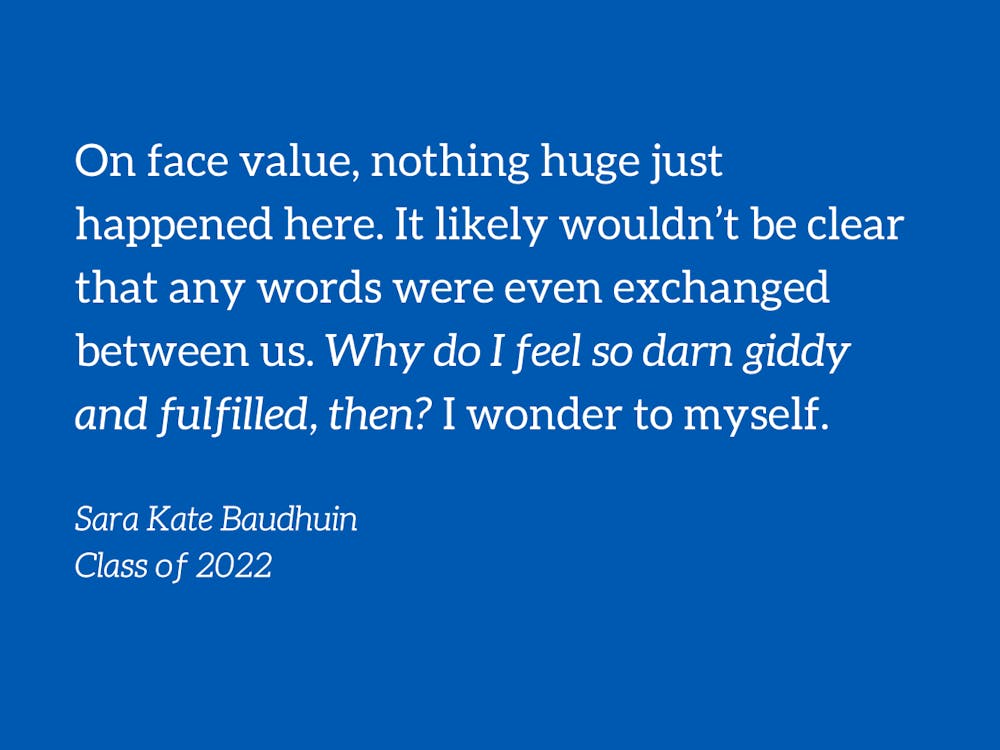Recently, I wrote about lifting a limo as an act of caretaking, but this week, I encountered kindness on the far opposite end of the theatrical spectrum, almost a bookend of sorts. This person offered up the idea that no, we often don’t need to go far out of our way—we may not even have to break our pace—to step into the caretaking realm.
I’m sitting on a bench in the gardens near the large grassy field, just next to the asphalt path that leads towards the main entrance. I watch as small families play with young kids near the pond and I see a solo student sitting cross-legged on a blanket while eating an apple and leafing through a novel (having himself quite a wistful, main character afternoon). As I’m smiling about this to myself, I break out of my observation when I see a glint of movement off on my left. Someone down at the base of the hill approaches the bend of the path, taking a nicely unorthodox route to get there.
A woman wearing a backpack weaves in and out of the stone path, half speed-walking, half jogging. She gets to a part where there’s two benches blockading her trail, so she needs to just cut around them entirely and off-road a bit (much to the dismay of the entire Duke Gardens staff, I have no doubt).
Bushwhacking her way through a patch of tall reeds, she bursts through a patch of mulch and meets the hill next to the big lawn. To me, this pace reads late to class or meeting, and assuming this is the case, she’s got her work cut out for her. It’s 3:23—7 minutes until her class (assuming she’s rushing to a 3:30), and the stressed look on her face confirms that this isn’t a leisure run (although, who among us haven’t taken a leisure run in our backpacks).
She’s barreling up the hill with gusto and begins to approach the part of the path where I’m sitting. When she arrives and we catch each other’s line of sight, I’m expecting a very flustered, if not disgruntled, set of emotions on her face, but there’s none of that there.
Instead of offering a closed-lipped smile that engages the fewest facial muscles possible, she actually swivels her head towards me, opens her smile into a full-toothed grin and offers me an out-of-breath “Hey!” She’s on the steepest part of the hill and doesn’t break her pace this whole time, but metaphorically breaks out of her stress-rushing state to give a huge smile. She continues up the hill and meanders out of sight towards the object of her rushing, and I’m left there on the bench, stumped.
On face value, nothing huge just happened here. If the apple-eating Whimsy Man happened to be looking in our direction, there’s likely nothing substantial he’d be able to say about this interaction. It likely wouldn’t be clear that any words were even exchanged between us. Why do I feel so darn giddy and fulfilled, then? I wonder to myself.
This story could be about this woman halting her rush to class to help me with some task in a heroic, self-sacrificial display of care. Maybe I’d just dropped a stack of papers and she stopped to pick them up, or perhaps I needed help carrying a cumbersome, heavy box up the hill and she offered to hold one side while we slowly walked together. Sure, that would be incredible, but what she did here—break out of her zone to offer a grin—required absolutely no compromising of her current mission.
This isn’t the same as embroidered-on-a-pillow, It costs nothing to be kind and smile territory that nudges us to plaster two-dimensional cheer on our faces, no matter our current reality. She didn’t totally leave her current reality of stress or try to hide her rushed pace for the sake of appearing present with me during our interaction. She didn’t actually slow down at all, but instead made her current reality a bit larger by making eye contact and welcoming me into it. It’s sort of like she decided, “Hey, I’m gonna do a toothy grin right now and let this stranger in on my amusement. I’m going to make this like we’re sharing a secret together. It’s funny to be late, right? It’s sort of amusing that I’m on this 200 meter-dash through the Gardens right now, right?”
This moment roots back to my original thesis in writing this column, that caretaking can often exist because of difficulty, not in spite of it. That grief, stress, frustration can open up a newfound space wherein we’re changed somehow and made slightly wider. Our joy ceilings are not lowered because of difficulty; our rooms often just expand. At its best on Duke’s campus, caretaking and kindness are not about ignoring or erasing difficult realities of what it means to exist as a student here or a human in the world. I think it’s about finding those wider spaces in our lives and searching for ways to make them homes to share with other people.
This woman’s late-to-class-stress is a low-stakes, less emotionally-loaded example, but what she did worked. She need not break her pace to infuse the texture of our interaction with kindness and joy; she found a way to do it with a bear-toothed grin.
Sara Kate Baudhuin is a Trinity senior. Her column runs on alternate Mondays.
Get The Chronicle straight to your inbox
Signup for our weekly newsletter. Cancel at any time.

